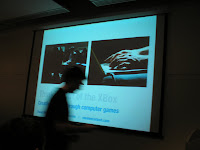 How often do we encourage our pupils? It can get a bit grating to be constantly offering praise. Has to be genuine.
How often do we encourage our pupils? It can get a bit grating to be constantly offering praise. Has to be genuine.Ewan started by saying it's about the process not the product (Gave example of Katie Melua re-writing song to make it more accurate but poorer love song.) He argued that concentration on final product can lead to mediocrity. He talked about the peer assessment possibilities of blogs.
How do you assess something like Watch the World? Do you just look at the final product?
What are games offering that traditional education doesn't? One thing is "levelling up". The idea of ever expanding challenges. Also the idea of cheat sheets to help people improve. Gives a new way of doing things. Gave the example of Ollie Bray using Guitar Hero as the focus for a Primary/Secondary transition project. They looked at venues for the concert, costs, orienteering round the building, designing guitars in CDT, designing posters in Art, writing biographies in English...
Gamers are getting older - 66% of gamers have children - Nintendads. But are teachers playing games? Ewan suggested teachers are under-represented.
Ewan showed the clip of Tim Rylands teaching. Asked us to consider what was traditional teaching and what was new? How was he praising?
Old: He brought out basic grammar stuff like metaphor and commas. Offered praise. He was relaxed and happy to be in the classroom.
New: Sat amongst the class. Class were in charge of where they went. Lots of noise and comment on what was happening.
The children were upset that the teaching ended.
Tim Ryland makes a game out of using language. See for example the Punctuation Pyramid (grammar as a game) and the Visuwords site that allows you to explore words in a way that beats a thesaurus. Wordle analyses text and makes the most common words appear larger - you can see where words are overused or to get a visual feel for the tense.
Tim also records pupils telling their work while standing in front of the Myst scene they are describing. Can do this for free with iMovie or online with Jumpcut. However, don't devalue the written work. Children need to write to work out the best bits. See also Kim's blog on the writing her children did based on the game Samarost.
Ewan has published all the links and explained himself more clearly on his blog. He also gave some examples of fiction using new media an example from CSI in second life and the BBC river journey on GoogleEarth and the We Tell Stories site. Easy to create your own stories with GoogleEarth like We Tell Stories. Big Art Mob - putting art on the map and street art locator.
Games like Hotel Room Secret - like geocachingfor hotels. Why not let Primary 7 explore a Secondary school by following clues. Threw lots of games like Sharkrunners and WebWars. Also, wormholes into games like the Oceanic Airlines site (with the hidden html message)connected to the Lost programme. Imagine a curriculum based on wormholes!
New: Sat amongst the class. Class were in charge of where they went. Lots of noise and comment on what was happening.
The children were upset that the teaching ended.
Tim Ryland makes a game out of using language. See for example the Punctuation Pyramid (grammar as a game) and the Visuwords site that allows you to explore words in a way that beats a thesaurus. Wordle analyses text and makes the most common words appear larger - you can see where words are overused or to get a visual feel for the tense.
Tim also records pupils telling their work while standing in front of the Myst scene they are describing. Can do this for free with iMovie or online with Jumpcut. However, don't devalue the written work. Children need to write to work out the best bits. See also Kim's blog on the writing her children did based on the game Samarost.
Ewan has published all the links and explained himself more clearly on his blog. He also gave some examples of fiction using new media an example from CSI in second life and the BBC river journey on GoogleEarth and the We Tell Stories site. Easy to create your own stories with GoogleEarth like We Tell Stories. Big Art Mob - putting art on the map and street art locator.
Games like Hotel Room Secret - like geocachingfor hotels. Why not let Primary 7 explore a Secondary school by following clues. Threw lots of games like Sharkrunners and WebWars. Also, wormholes into games like the Oceanic Airlines site (with the hidden html message)connected to the Lost programme. Imagine a curriculum based on wormholes!





3 comments:
This was a great session.
Very easy, free flowing, yet jam packed of vital nuggets to take away and chew over...
loads of stuff covered, plenty to go away and explore...
Thanks David for the rundown - we did get through a lot didn't we?! And Rich, the comments like that always make a difference. Thanks!
It was the number of ideas just thrown in at the end that left me behind a bit. :-)
So much to try, so little time! :-)
Post a Comment